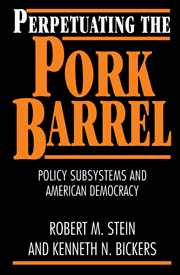1 - Policy subsystems and the pork barrel
Published online by Cambridge University Press: 05 June 2012
Summary
On November 3, 1992, Mike Andrews, Democrat from Houston, Texas, was reelected to his sixth term in the U.S. House of Representatives. Andrews received only 54.5 percent of the vote in defeating Dolly Madison McKenna, a candidate who had never run for elective office. Previously, Congressman Andrews had breezed through his reelection bids. In 1986 he was unopposed; in 1988 he won with 71 percent of the vote; and in 1990 he received 65 percent of the vote. His 1992 reelection bid demonstrated that he had become vulnerable. Something needed to be done to shore up his support in the district. A week later his administrative assistant approached him about shifting staff resources to his district office in Houston. The plan that he and his staff devised was to focus their efforts on bringing more federal spending into his district. They would aggressively seek federal grant awards for his constituents. The idea was to link the congressman to good things that were coming into the district. Grant awards would make him more familiar and valuable to his constituents. Not coincidentally, new grant awards would also provide him with the opportunity to garner positive media coverage. The efficacy of this strategy was not tested by Congressman Andrews, however, as he gave up his House seat in 1994 for a primary bid for a seat in the U.S. Senate.
- Type
- Chapter
- Information
- Perpetuating the Pork BarrelPolicy Subsystems and American Democracy, pp. 3 - 12Publisher: Cambridge University PressPrint publication year: 1995
- 1
- Cited by

